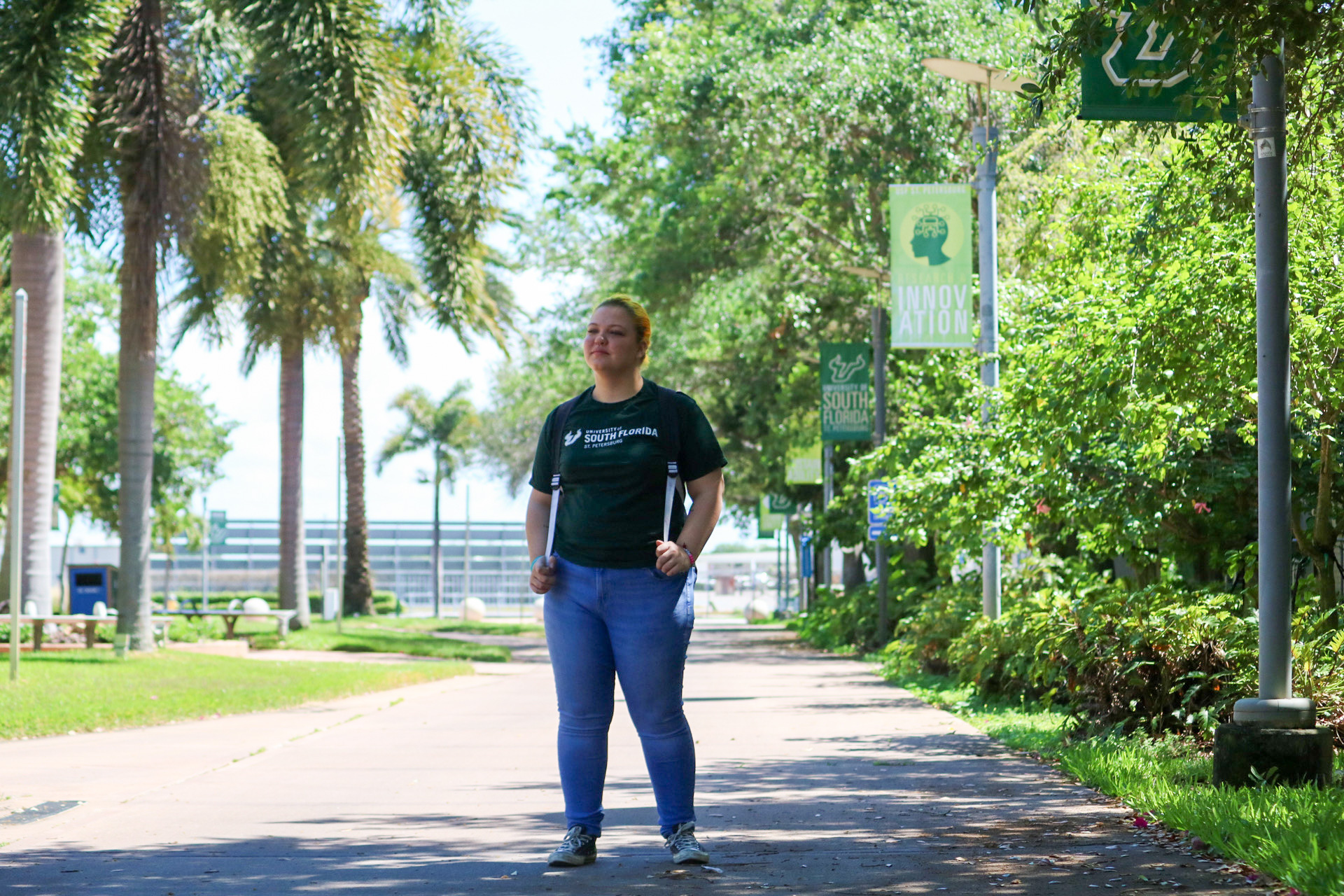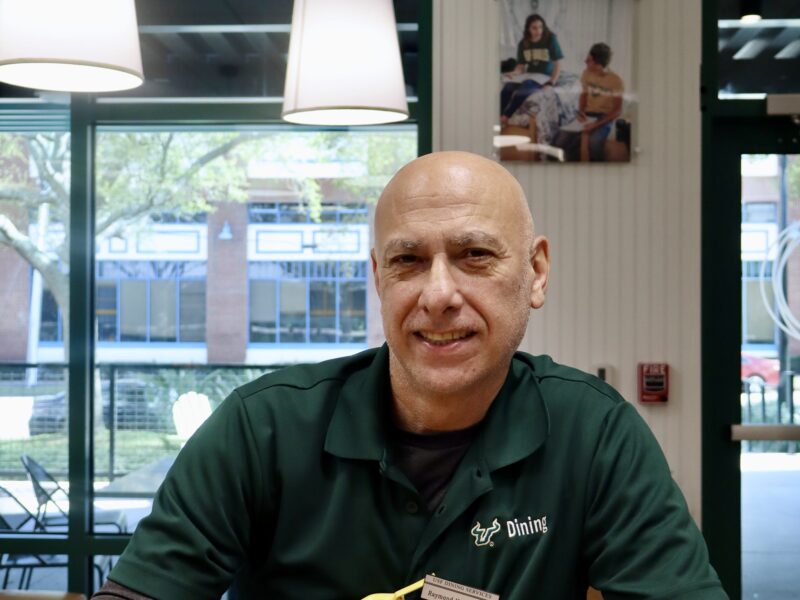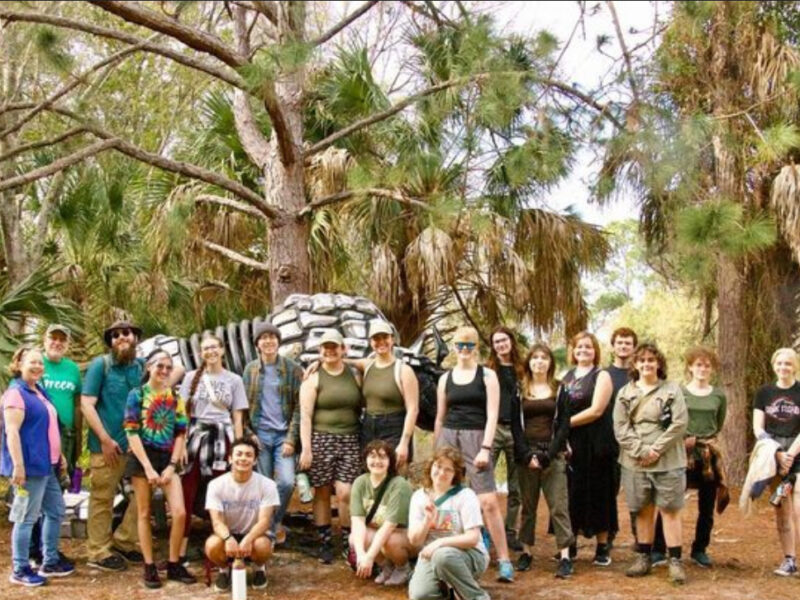Pictured above: Lillie Carter, a sophomore political science major, walks on an empty campus, as most students have returned home amid the coronavirus pandemic.
Story and photos by Carrie Pinkard
Two weeks ago she was crying in the middle of a Ripley’s Believe It Or Not! museum.
Her employer called to tell her she’d been let go. But after negotiating with him in front of a wax figure of the world’s fattest man, he agreed to let her keep a mere six hours a week.
Lillie Carter, 19, is a sophomore who works at USF St. Petersburg’s dining hall, The Reef.
Over the past few weeks, as the coronavirus pandemic has swept the nation, life on campus has shuttered around her.
Within a few days, the university announced that classes are to be held online, communal spaces — including the library — will be closed, and students who don’t need to be there should not return to campus until at least May 7.

Carter watched as most of her friends packed a bag and left the dorms. Many of them returned home to live with their parents.
The waterfront campus is typically filled with students longboarding and swerving in and out of its palm trees. Two days after spring break’s end, Carter says she is startled to see even one other student on campus.
“It’s like if you were to be walking in the woods and you see a deer,” she said. “You both stare at each other and try to figure out what the other one’s doing there.”
Carter said going home isn’t an option for her. She doesn’t have a positive relationship with her family, who lives in Michigan, and she supports herself financially with the help of scholarships.
The university is her home year round, and she said the closures on campus have left her feeling claustrophobic.
“The library closing was a big deal for me. It’s where everyone meets up between classes to chat and catch up on work,” she said. “The Reef is also a biggie. To me, that’s my kitchen and dining room, so it’s kind of like a chunk of my house is gone.”
The Reef is still open, but tables and booths are blocked so students don’t sit down. All of the former self-serve options are gone, and students have to request extras like salt, pepper and napkins from employees.
Before the pandemic, Carter would serve dozens of customers during her shift. Now, she makes, at most, three sandwiches over six hours.
She used to be scheduled 24 hours a week. Now she works for six hours every Saturday, which brings her income down to $200 a month.
Carter spends most of her time in her dorm in the University Student Center, which she shares with a roommate. Carter is a night owl and her roommate is an early bird, so their schedules are always clashing.
Pre-pandemic, one of them could simply walk down the hall for a break. However, with all of the lounges in the dorms closed, Carter no longer has a place to escape and drown out life with the dull hum of a cable tv.
There are no events allowed on campus, and student organizations aren’t meeting. With only one shift left on her work schedule, Carter is left with plenty of free time.
“I mostly stare into the void of my dorm,” she said.
“I’ve been reading philosophy books. I just finished a book by Comte. I even read one of my textbooks. Front to back. There’s nothing to do here.”
One bright spot in Carter’s life is the pen pal program that was started by Compass Student Experience on campus . She says the program pairs lonely college students who are quarantined with students from other colleges around the nation.
“I’m talking to a girl named Julie, she’s super awesome,” Carter said, “She goes to Lewis and Clark University in Oregon. We’ve been talking at least once a day because we’re just both so bored. We exchanged phone numbers, and I think we’re going to FaceTime later. We keep asking each other, ‘What are we going to do?’”
Carter is not only bored, but apprehensive about the future.
She has heard rumors the campus might shut down completely over the summer and that students might not be able to stay in the dorms. If this happens, she has no idea how she will pay for a place to live. Her scholarship pays for housing, but only if it’s on campus.
Each year, the university requires students to leave the dorms for eight to 10 days between the spring and summer semesters. Last year, Carter paid for an Air bnb so she had somewhere to stay while waiting for her dorm to reopen.
This year, with her dwindling paycheck, she says she doesn’t know how she’ll afford a place to stay.
The 19-year-old college student said she understands she’s lucky to be in school and have a job for now. She said she is practicing social distancing and taking the pandemic seriously. She just wishes the university understood that not all students have their parents as a safety net when things go south.
“Everything on campus is at a complete stop, but the world never actually stops turning,” Carter said. “There are bills to pay and assignments to do. I’m frustrated because I feel like the university assumes that, just because I am a student, I have a fallback.”
With her friends gone, no car to drive anywhere, and no in-person communication with classmates, Carter said the cabin fever is kicking in.
“The worst part about this is there’s nothing to look forward to,” she said. “I’m a goal-oriented person, so I like to think, ‘If I get this work done, then I can go do this fun thing.’ And now, it’s like, ‘Oh, if I get this work done, I can continue to lie in bed.’”
Carter said she spends “99.9 percent” of her time in the dorm working on her political science classes. She goes days without putting on real pants. Even the smallest outing feels like an adventure for her.
“Sometimes I’ll go to CVS,” she said. “If I’m feeling frisky.”



